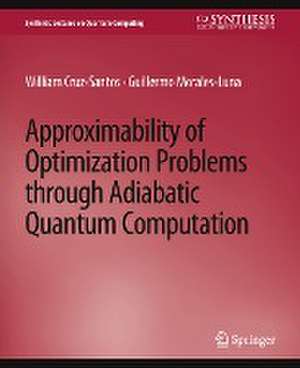Approximability of Optimization Problems through Adiabatic Quantum Computation: Synthesis Lectures on Quantum Computing
Autor William Cruz-Santos, Guillermo Morales-Lunaen Limba Engleză Paperback – 7 oct 2014
Preț: 234.87 lei
Nou
Puncte Express: 352
Preț estimativ în valută:
44.94€ • 48.06$ • 37.47£
44.94€ • 48.06$ • 37.47£
Carte tipărită la comandă
Livrare economică 14-19 aprilie
Preluare comenzi: 021 569.72.76
Specificații
ISBN-13: 9783031013911
ISBN-10: 3031013913
Ilustrații: XV, 97 p.
Dimensiuni: 191 x 235 mm
Editura: Springer International Publishing
Colecția Springer
Seria Synthesis Lectures on Quantum Computing
Locul publicării:Cham, Switzerland
ISBN-10: 3031013913
Ilustrații: XV, 97 p.
Dimensiuni: 191 x 235 mm
Editura: Springer International Publishing
Colecția Springer
Seria Synthesis Lectures on Quantum Computing
Locul publicării:Cham, Switzerland
Cuprins
Preface.- Acknowledgments.- Introduction.- Approximability of NP-hard Problems.- Adiabatic Quantum Computing.- Efficient Hamiltonian Construction.- AQC for Pseudo-Boolean Optimization.- A General Strategy to Solve NP-Hard Problems.- Conclusions.- Bibliography.- Authors' Biographies.
Notă biografică
William Cruz-Santos is a full-time professor of Mathematics and Computer Science at the Computer Engineering at the Universidad Autonoma del Estado de Mexico. Dr. Cruz-Santos' research interests include design of adiabatic quantum algorithms for solving NP-hard problems and simulation of quantum systems, as well as computational complexity analysis and algorithm design of classical algorithms. Dr. Cruz-Santos is particularly interested in the development of adiabatic quantum algorithms applied to computer vision problems from a combinatorial optimization point of view. Dr. Cruz-Santos holds a B.Sc. in Computer Science from the Universidad Juarez Autonoma de Tabasco, as well as M.Sc. and Ph.D. degrees in Computer Science, both degrees from the Centro de Investigacion y de Estudios Avanzados del IPN (Cinvestav-IPN).Guillermo Morales-Luna received the BSc degree in Mathematics from the Mexican National Polytechnic Institute in 1977, the MSc degree in Mathematics from Mexican Cinvestav-IPN, in 1978, and the PhD degree from the Mathematics Institute of the Polish Academy of Sciences in 1984. Since 1985 he is a researcher at Cinvestav-IPN. His research interests include cryptography, complexity theory, and mathematical logic. He is a Mexican national and he also holds Polish citizenship.













